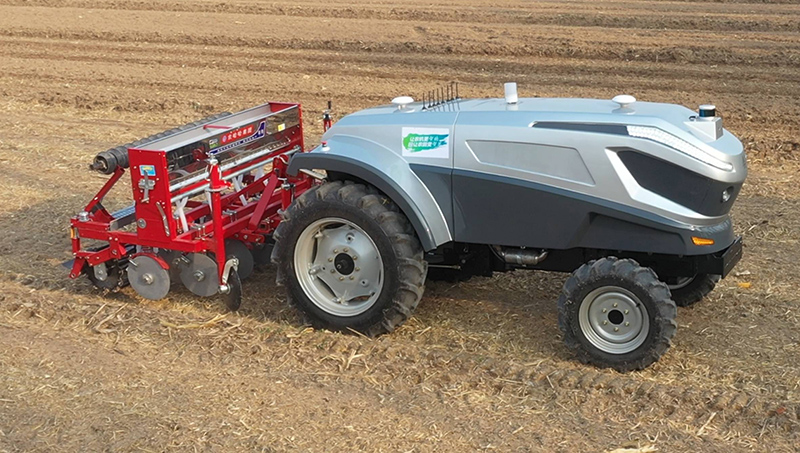AI-Controlled Tractors Leading the New Era of Smart Agriculture: Revolutionizing Global Farming Efficiency
In the 21st century, agriculture is undergoing a transformation unlike any in its history. From Europe’s vast farmlands to the arid regions of the Middle East, artificial intelligence (AI) is reshaping how crops are cultivated, harvested, and managed. At the forefront of this revolution stand AI-controlled tractors — autonomous machines that combine advanced sensors, GPS technology, and deep learning algorithms to optimize every stage of farm operations.
For decades, farmers have sought ways to increase productivity while reducing costs and environmental impact. Now, AI-driven automation offers a path toward sustainable efficiency — ensuring that even regions facing labor shortages, unpredictable climates, or resource scarcity can continue to thrive.
The Rise of AI in Agriculture
AI technology has moved from research labs into the heart of farming. Modern tractors are no longer simple mechanical tools; they are intelligent systems capable of analyzing soil health, adjusting planting density, navigating terrain, and even communicating with drones and irrigation systems.
In Europe, AI-powered tractors are helping reduce fertilizer and pesticide use by analyzing data from hundreds of onboard sensors. Meanwhile, in the Middle East, where water is one of the scarcest resources, precision-controlled tractors optimize irrigation timing, ensuring maximum yield with minimal waste.
How AI-Controlled Tractors Work
At their core, AI tractors rely on a combination of machine vision, LiDAR, GPS mapping, and machine learning algorithms. These technologies allow the vehicle to “see” and “think” like a human operator — identifying obstacles, recognizing crop types, and planning routes for efficient coverage.
Key features include: real-time terrain analysis, automated seed planting, predictive maintenance, and synchronized data sharing with drones and soil sensors. These capabilities drastically reduce operational costs while improving output quality and consistency.

Benefits for Global Agriculture
The advantages of adopting AI-controlled tractors extend beyond simple automation. They address major challenges faced by modern farmers, including labor shortages, high fuel costs, and environmental degradation.
1. Increased efficiency with 24/7 operations.
2. Reduced environmental impact through optimized fuel and chemical use.
3. Enhanced decision-making with real-time analytics.
4. Labor optimization in regions facing workforce shortages.
Q: What makes AI tractors different from traditional autonomous vehicles?
AI-controlled tractors learn from real-world data, adapting to changing field conditions automatically. If soil moisture or density shifts, they adjust planting or irrigation strategies in real time — a capability far beyond traditional automation.
The Role of Data in Smart Farming
AI tractors continuously collect data from sensors, satellites, and weather feeds. This information is processed through cloud-based analytics to optimize productivity and resource management. Farmers can remotely monitor operations and fine-tune strategies via mobile apps.
Q: Are AI-controlled tractors affordable for small and medium-sized farms?
Yes. Manufacturers now offer modular AI systems that retrofit traditional tractors, allowing small and medium farms to adopt automation at a lower cost while still enjoying efficiency gains.
The Middle East and Europe: Driving Forces of AI Agriculture
Europe’s sustainability goals and Middle Eastern nations’ food security strategies are driving massive investment in AI-based agricultural machinery. From Germany’s precision farming programs to Saudi Arabia’s Vision 2030 initiatives, autonomous tractors are reshaping regional economies.
Challenges and Future Outlook
Despite high initial costs and the need for skilled operation, AI tractors promise long-term value. As component prices drop and training improves, adoption will accelerate. Experts predict that by 2030, one in three tractors worldwide will have built-in AI capabilities.
Q: How does AI contribute to sustainable farming practices?
AI reduces waste by applying precise amounts of water, fuel, and fertilizers. It ensures eco-friendly cultivation while maintaining profitability — a vital balance for sustainable agriculture.
Social and Economic Impacts
AI tractors empower farmers to focus on planning and management rather than repetitive labor. Automation helps maintain agricultural productivity amid labor shortages while improving economic resilience through data-driven insights and financing access.
Q: Can AI tractors operate under extreme conditions like deserts or snowy fields?
Yes. AI tractors feature adaptive navigation systems that automatically adjust traction and energy output for sand, mud, or snow — ensuring consistent performance in all terrains.
The Road Ahead: A Smarter, Greener Agriculture
The combination of AI, automation, and sustainable practices is revolutionizing global agriculture. As technology continues to evolve, AI-controlled tractors will define a new era of efficiency, intelligence, and environmental harmony in farming.
5. Get Your Personalized Solution Now
→ Call the selection hotline: +86 158 5359 8030 (also supports accessory customization inquiries).








